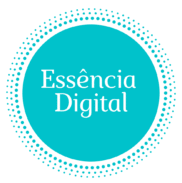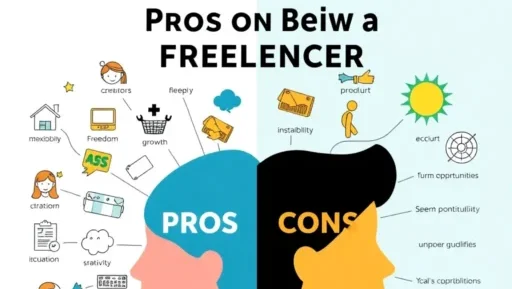The Freelance Equation: A Realistic Look at the Pros and Cons in 2025
The allure of freelancing has never been stronger. In an era defined by digital connectivity and a widespread re-evaluation of traditional work structures, the prospect of being your own boss is incredibly compelling. The promise of setting your own hours, choosing your projects, and working from anywhere in the world has drawn millions in Brazil and across the globe into the freelance economy.
However, for every success story of a digital nomad working from a beach in Bahia, there is an unspoken reality of chasing invoices, navigating complex tax laws, and facing income uncertainty. A successful freelance career is not an escape from work; it’s a different way of working that comes with a unique set of advantages and challenges. Before you take the leap, it’s crucial to look at both sides of the coin with clear eyes. This is an in-depth, realistic guide to the pros and cons of being a freelancer in 2025.
The Major Advantages of Being a Freelancer
These are the powerful benefits that attract professionals to a life of independence.
1. Unmatched Flexibility and Autonomy
This is the number one reason people choose to freelance. You are the architect of your own work life.
- Control Your Schedule: You can structure your workday around your life, not the other way around. This means being able to attend a child’s school event, go to a doctor’s appointment without asking for permission, or work during your peak productivity hours, whether that’s at 6 AM or 10 PM.
- Geographic Freedom: Your office can be anywhere with a stable internet connection. This opens up the possibility of being a digital nomad, exploring different parts of Brazil or the world, or simply having the comfort of a well-designed home office.
- Curate Your Work: As you build your reputation, you gain the power to select projects and clients that genuinely interest you and align with your values. You can actively steer your career towards work you find meaningful.
2. Direct Control Over Your Income and Growth
In a traditional job, your salary is often capped by company pay scales and annual review cycles. As a freelancer, your earning potential is directly tied to your efforts and strategic decisions.
- No Salary Ceilings: Your income is a result of the number of projects you take on, the rates you command, and the value you provide. High-performing freelancers often earn significantly more than their salaried counterparts.
- The Power to Set Your Rates: As you gain experience, testimonials, and a stronger portfolio, you have the autonomy to increase your prices to reflect your growing expertise.
- Build an Asset: You are not just earning a wage; you are building a business. This could evolve into a larger agency, a productized service, or a powerful personal brand that becomes a valuable asset in itself.
3. Accelerated Skill and Personal Development
Freelancing is a business school in real-time. The sheer variety of responsibilities forces you to grow in ways a traditional job often can’t.
- Diverse Project Exposure: Working with multiple clients across different industries exposes you to new challenges, tools, and ways of thinking, rapidly expanding your skillset.
- Mastering Business Acumen: You are forced to become proficient in marketing, sales, negotiation, project management, and financial planning. These are highly transferable skills that make you a more well-rounded and resilient professional.
- Fostering Self-Discipline: Without a boss looking over your shoulder, you cultivate deep self-discipline, resilience, and creative problem-solving abilities.
The Challenges and Drawbacks of Freelancing
These are the critical realities that every aspiring freelancer must prepare for.
1. Income Instability and Financial Pressure
The “feast or famine” cycle is the most significant source of stress for most freelancers.
- Inconsistent Cash Flow: Your income can fluctuate dramatically from one month to the next. A project getting delayed or an invoice being paid late can have a direct impact on your personal finances.
- No Employer Safety Net: There are no paid vacations, sick days, or employer-sponsored health plans. In Brazil, you are solely responsible for your own contributions to the INSS (social security) and for planning your retirement.
- The Burden of Taxes: You are your own accounting department. You must meticulously track your income and expenses and manage your tax obligations, which for freelancers in Brazil often involves the monthly Carnê-Leão system and an annual declaration (Imposto de Renda). Failure to do so can result in significant penalties.
2. You Are the Entire Business
The autonomy of being your own boss means you also carry all of the responsibilities.
- The Unbillable Hours: A significant portion of your time (often 30-40%) is spent on non-billable but essential tasks: marketing, prospecting for new clients, writing proposals, networking, and handling administrative work.
- Wearing All the Hats: You are the IT support, the legal department, and the collections agency. When a technical issue arises or a client is late on a payment, it’s up to you to solve it.
- Constant Hustle: Especially in the beginning, there is constant pressure to be marketing yourself and looking for the next project, even while you’re busy with current work.
3. The Risk of Isolation and Burnout
The freedom of working from home can easily become a double-edged sword.
- Professional Isolation: You miss out on the spontaneous collaboration, social interaction, and camaraderie of a traditional workplace. There’s no team to celebrate wins with or to lean on during challenging times.
- Blurred Work-Life Boundaries: When your home is your office, it can be incredibly difficult to “switch off.” The temptation to answer one more email or finish one more task late at night can lead directly to burnout.
- Lack of Structure: The absence of a formal career ladder or mentorship from a senior leader means you are solely responsible for charting your own professional development and career progression.
Making the Right Choice for You
Freelancing is not inherently better or worse than traditional employment—it’s different. The right choice depends entirely on your personality, risk tolerance, and career priorities. Ask yourself honestly:
- Do you thrive on structure, or are you highly self-motivated and disciplined?
- Are you comfortable with financial uncertainty, or do you value the stability of a predictable salary?
- Do you enjoy the business side of work (marketing, sales, admin), or do you prefer to focus solely on your craft?
For many, the answer lies in preparation. By creating a solid financial buffer, building disciplined routines, and actively seeking out communities of other freelancers (online or in co-working spaces), you can effectively mitigate the cons and fully embrace the incredible rewards that a freelance career has to offer.

